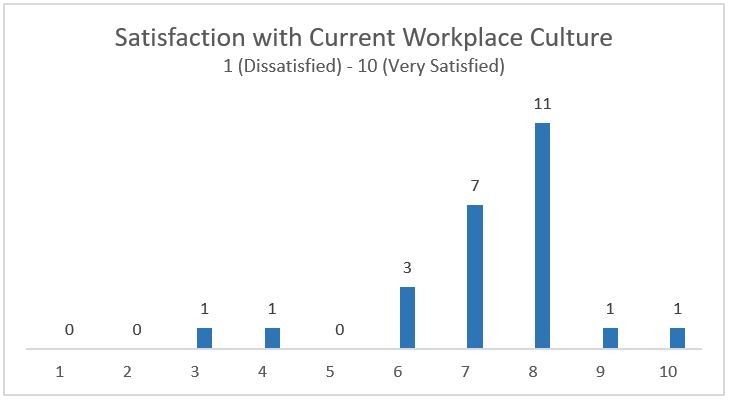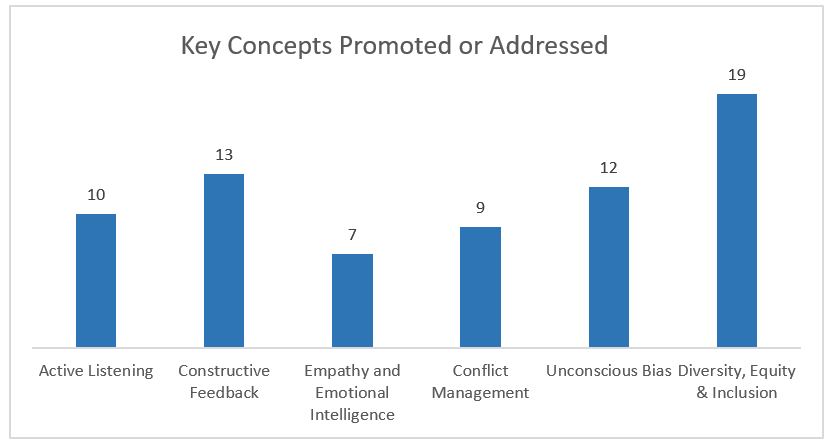Workplace Culture in Higher Education: Embracing Empathy
Publication Date: July 1, 2021
The focus of the summer 2021 issue of College and University Auditor is workplace culture, a topic which has moved to the forefront as employees assess their current work situation. ACUA members contributed articles related to emotional intelligence, professional feedback and changing stakeholders’ perceptions of internal audit. In this ConnectFurther article, we examine another component of workplace culture: empathy. Here, we provide some insight into what empathy is and how it can be utilized to enhance overall culture. We also reflect on the results of the workplace culture survey created by the ACUA journal staff. This survey asked our members how they view the culture at their workplaces and what methods they have introduced to foster a positive workplace environment.
Empathy is defined by the Cambridge Dictionary as: “the ability to share someone else’s feelings or experiences by imagining what it would be like to be in that person’s situation.”
Empathy is defined by the Cambridge Dictionary as: “the ability to share someone else’s feelings or experiences by imagining what it would be like to be in that person’s situation.”[1] While many of us were taught to be empathetic towards each other when we were young, exercising empathy in the workplace can be an entirely different challenge. For this to happen, we must all work to increase our awareness of and respect for the feelings, opinions, experiences and perspectives of our coworkers. This increased awareness may not happen overnight. However, by making this a focus of your institution’s communications and training, you can help to create an empathetic workplace culture. According to GovLoop[2], a knowledge-based training and thought leader for government and non-profit institutions, there are six key concepts related to fostering empathy in the workplace: Active Listening, Constructive Feedback, Emotional Intelligence, Conflict Management, Unconscious Bias, and Diversity, Equity & Inclusion.
Key Concepts
- Active Listening – This is the process of concentrating on the individual or individuals who are speaking, so that you can fully understand the information they wish to convey. Understanding what other people are trying to say is a vital component of being empathetic. In addition, active listening shows colleagues that you respect them and value their perspectives.Constructive feedback is extremely important in fostering a positive workplace culture.
- Constructive Feedback – Constructive feedback is extremely important in fostering a positive workplace culture. Instead of pointing out every negative aspect of an employee’s performance, practice empathy by giving feedback that recognizes their strengths while identifying how they could be more effective. This can increase employees’ openness to your suggestions and strengthen your organization’s overall workforce.
- Emotional Intelligence – While active listening allows people to understand each other’s perspectives or situations, providing training that increases emotional intelligence helps employees stay cognizant of their colleagues’ feelings as well. This enhances the productivity of communication between employees and fosters a supportive workplace culture.
- Conflict Management – Training in this area can help employees understand their unique style of conflict management and determine the style used by their coworkers. This knowledge allows employees to better navigate disagreements by approaching them from a place of mutual understanding rather than judgment.
- Unconscious Bias – Everyone is susceptible to unconscious biases formed by the content they consume and the experiences they have throughout their lives. Bias-related training can help employees identify and understand their own biases. Combining this awareness with the other elements of empathy can help break down unconscious biases by cultivating meaningful, thoughtful relationships.Senior management can set the tone throughout the institution by providing an open, non-judgmental forum for individuals to share their experiences.
- Diversity, Equity & Inclusion – Promoting practices that hold individuals accountable for fostering diversity and inclusion also creates a positive, welcoming workplace culture. To ensure a more diverse workforce, examine processes such as recruitment and conflict resolution using the elements of empathy. Senior management can set the tone throughout the institution by providing an open, non-judgmental forum for individuals to share their experiences.
Survey Overview
The ACUA journal staff created a workplace culture survey to gain a better understanding of how these six concepts have been implemented across our institutions. We received 25 responses, with 80% of respondents indicating they work in the public sector and 72% stating that they work in an audit shop of one to five individuals. Of these respondents, 68% hold the title of manager, director or Chief Audit Executive. In addition, 92% have been with their institutions for three years or longer, allowing them ample time to gain a good understanding of both the current workplace culture and recent changes.
Detailed Results
The survey asked a series of questions related to workplace culture. The first question (see chart below) asked individuals to rate their satisfaction with their current workplace culture from one (dissatisfied) to 10 (satisfied). Our respondents were largely satisfied with the culture at their workplaces, with 84% rating their current employers between six and eight, and 92% rating their institutions six or higher.
Although our response data is not comprehensive enough to draw comparisons against other industries, the results indicate that our ACUA members feel generally positive about their current workplaces and the efforts underway to enhance workplace culture.
Over 90% of the respondents acknowledged that their institutions have taken steps to address Diversity, Equity & Inclusion.
The next part of our survey explored which of the six key concepts of empathy respondents felt their organizations promoted or had taken steps to address. Over 90% of the respondents acknowledged that their institutions have taken steps to address Diversity, Equity & Inclusion. In contrast, only 33% recognized their organizations as promoting Empathy and Emotional Intelligence.
It is no surprise that the concept of Diversity, Equity & Inclusion ranked so high in our surveys, as this has been a hot topic in the United States of late. It is inspiring to see such a high percentage of our institutions actively working to address this issue and promote change. On the other hand, the relatively low percentage of organizations actively promoting Empathy and Emotional Intelligence highlights the challenges of implementing change in these areas.
The final question in our survey asked respondents to comment on methods their departments, organizations and institutions have utilized to promote these six key concepts. It is our hope that these responses may help to highlight steps that the rest of our community can take to continue building a positive workplace culture for everyone!
Approaches for Enhancing the Six Key Concepts of Empathy
- Conducted mandatory training geared towards listening and communication
- Established and required compliance with “Rules of Engagement” that address each of the six key concepts
- Created open door policies and flexible scheduling
- Formed Diversity, Equity & Inclusion committees to draft policies
- Created a campus-wide Employee Engagement survey
- Included Diversity, Equity & Inclusion in the university’s Strategic Plan
- Created positions at the Vice President level to direct Diversity, Equity & Inclusion and Unconscious Bias training
- Participated in a Franklin Covey[3] training series as a department
- Embedded metrics centered around the six key concepts in the institution’s Human Resources review criteria
References
- Cambridge Dictionary. (n.d.). Empathy. In dictionary.cambridge.org dictionary. Retrieved June 29, 2021, from https://dictionary.cambridge.org/us/dictionary/english/empathy
- https://www.govloop.com/resources/empathy-in-the-workplace-a-govloop-toolkit/
- https://resources.franklincovey.com/culture-transformation



